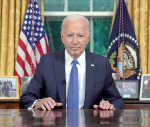You are here
Pete McCloskey: An American hero
May 27,2024 - Last updated at May 27,2024
Former Congressman Pete McCloskey died last week at the age of 96. By anyone’s definition, Pete was a hero, courageous and selfless on the battlefield, fearless and principled in elective office, an advocate for justice and equity, and always a truth-teller even when he paid a price for speaking out.
Pete entered the national consciousness in 1967 when following the death of the incumbent representative he won a special election to Congress. The contest attracted attention because Pete’s main opponent was former film star Shirley Temple Black, who was endorsed by fellow actor Ronald Reagan, and because this highly decorated Marine Colonel was a vocal critic of the Vietnam war.
Pete won that election and seven subsequent reelection contests. His victory, the first by a Republican opponent of the war, sent shockwaves through Congress.
In Congress, Pete continued to challenge his party and the nation. Pete knew the horrors of combat and opposed Nixon’s continuation of a war that had taken too many lives and could never be won. And after the 1972 election, when it was revealed that Nixon ordered covert operatives to break into his Democratic opponent’s headquarters and then tried to cover up this crime, Pete became the first congressional Republican to call on Nixon to resign.
I first met Pete in the mid-‘70s and in that first meeting he taught me a lesson I never forgot. Having started the Palestine Human Rights Campaign (PHRC), I was looking for members of Congress to support cases of Palestinian victims of rights abuse. Knowing that he was a courageous advocate, I went to see him and immediately began pressing my case.
At one point, Pete cracked a joke, but too intent on pressing forward, I continued. He stopped and asked what I thought of what he had said. I responded that what I was saying was serious and continued. He stopped me again and said, “I’ll tell you what’s serious. Supporters in my district who’ve been friends of mine for years would be upset if they even knew I was meeting with you to discuss Palestinian rights. You don’t know me yet want me to take a stance on something that would offend them. Why don’t you think that over, get a sense of humour, and come back and see me?”
Stunned, I left. After reflecting on his words, I never approached another elected official the same way. Building relationships, getting to know people you want to influence and letting them know you, it was the way my father succeeded in his grocery store. His customers liked and trusted him. In politics, I needed to do the same.
Eventually I went back to see Pete. He not only endorsed the case I was presenting but also became a strong supporter of Palestinian rights and the PHRC.
As a congressman, Pete was a champion for women’s rights, the environment (author of the Endangered Species Act and co-founder of Earth Day), and of course, Palestinian rights.
In 1980 and again in 1982, he travelled to Beirut to meet with Yasir Arafat, challenging the US “no talk policy” with the PLO.
After visiting other Arab countries on that visit, Pete made the following statement to press:
“In every Arab heart there is the inexorable conviction” [that the Israeli invasion would not be happening] “without the consent and indeed the approval of the United States…We pay the price for that hatred growing in a substantial part of the world”.
After leaving Congress, Pete’s activism on behalf of justice continued. In the late 1980s he co-founded a group to align America’s Middle East policy with its national interests. He also provided legal support to the survivors of the USS Liberty, the naval vessel targeted and sunk by Israeli bombs during the 1967 war. In 1993, he filed a lawsuit on behalf of activists against the Anti-Defamation League, charging it with violating California’s constitutional right to privacy by illegally obtaining and using the activists’ personal information to defame or silence them.
A week before he passed away, I had the chance to speak with him. I reminded him of the lessons he taught me and what a hero he was to those who believe that elected officials could be principled, non-partisan fighters for justice. He made me tear up when he replied how he had also been inspired by my life’s work.
He may be gone, but the lessons he taught will live on. You can be principled and personable. In politics, like business, relationships matter. And if you fight for what you believe in, at the end of the day, it will be known that yours was a life well lived. That was Pete McCloskey.
The writer is president of the Washington-based Arab American Institute















Add new comment